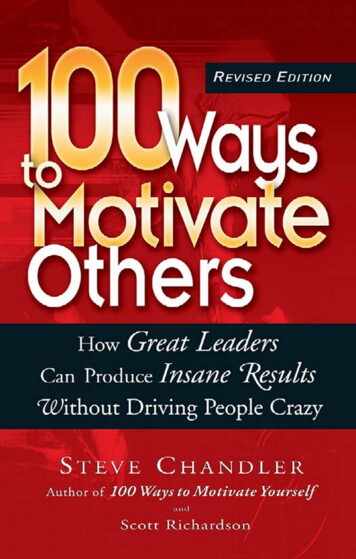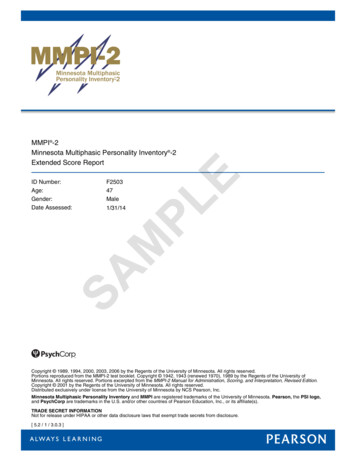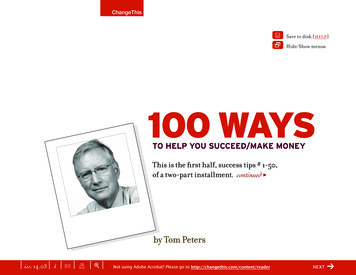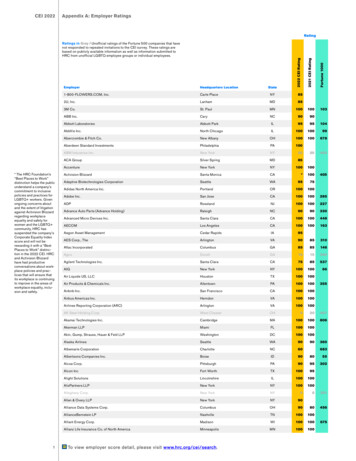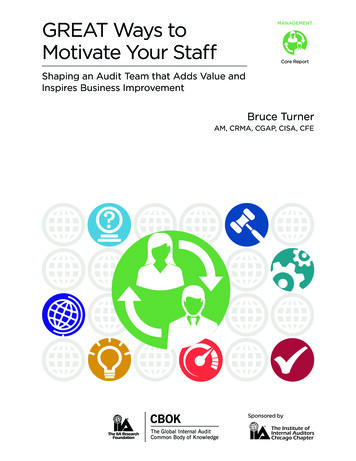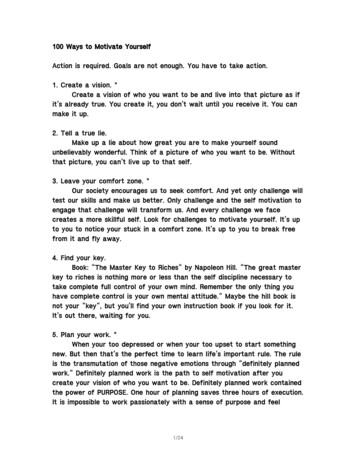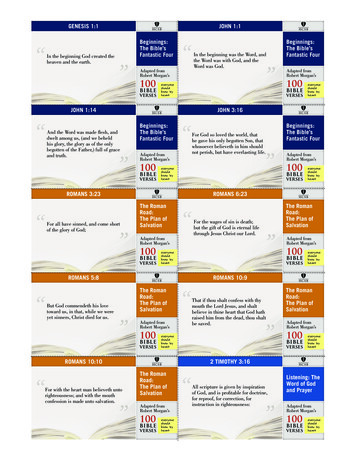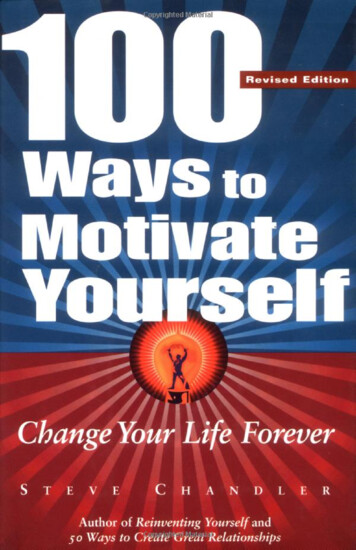
Transcription
Covertitle:author:publisher:isbn10 asin:print isbn13:ebook isbn13:language:subjectpublication date:lcc:ddc:subject:100 Ways to Motivate Yourself :Change Your Life ForeverChandler, Steve.The Career tivation (Psychology) ,Self-actualization (Psychology)2001BF503.C48 2001eb158.1Motivation (Psychology) ,Self-actualization (Psychology)coverPage 1100 Ways to Motivate YourselfRevised EditionChange Your Life Forever
page 1Page 2This page intentionally left blank.page 2Page 3100 Ways to Motivate YourselfRevised EditionChange Your Life ForeverSteve Chandlerpage 3Page 4Copyright 2001 by Steve ChandlerAll rights reserved under the Pan-American and International CopyrightConventions. This book may not be reproduced, in whole or in part, inany form or by any means electronic or mechanical, includingphotocopying, recording, or by any information storage and retrievalsystem now known or hereafter invented, without written permissionfrom the publisher, The Career Press.100 WAYS TO MOTIVATE YOURSELFCover design by Cheryl FinbowEdited by Robert M. Brink and Jodi BrandonTypeset by Ellen S. WeitzenhoferPrinted in the U.S.A. by Book-mart PressTo order this title, please call toll-free 1-800-CAREER-1 (NJ andCanada: 201-848-0310) to order using VISA or Master Card, or forfurther information on books from Career Press.The Career Press, Inc., 3 Tice Road, PO Box 687,Franklin Lakes, NJ 07417www.careerpress.comLibrary of Congress Cataloging-in-Publication DataChandler, Steve, 1944100 ways to motivate yourself : change your life forever / bySteve Chandler.—Rev. ed.p. cm.
Includes index.ISBN 1-56414-519-0 (pbk.)1. Motivation (Psychology) 2. Self-actualization (Psychology) I.Title One hundred ways to motivate yourself. II. Title.BF503 .C48 2001158.1—dc2100-065106page 4Page 5To Kathryn Anne Chandlerpage 5Page 6AcknowledgmentsTo Robert Brink and Jodi Brandon for the masterful editing, to LindsayBrady for the ongoing perception of success, to Stephanie Chandler fortirelessly working the cosmos, to Kathy for more than I can say, to JimBrannigan for the representation, to Fred Knipe for the music on NewYear's Eve, to Ron Fry for Career Press, to Karen Wolf for theinternational distribution, to Nathaniel Branden for the psychology, toColin Wilson for the philosophy, to Arnold Schwarzenegger for a day toremember, to Rett Nichols for the tension plan, to Graham Walsh forthe Tavern on the Green, to Terry Hill for the century's first realmystery novel, to Cindy Chandler for the salvation, to Ed and Jeannefor the Wrigley Mansion, to John Shade for the fire, to Scott Richardsonfor the ideas, to Ann Coulter for the wake up calls, to Steven ForbesHardison for coaching and friendship beyond the earthly norm, and toDr. Deepak Chopra for unconcealing the creative intelligence that holdsus all together.And to the memory of Art Hill:without whom,no life, no nothin'.page 6Page 7ContentsPreface: Cyber MotivationIntroduction: You have no personality100 Ways1. Get on your deathbed2. Stay hungry3. Tell yourself a true lie1115192123
4. Keep your eyes on the prize5. Learn to sweat in peace6. Simplify your life7. Look for the lost gold8. Push all your own buttons9. Build a track record10. Welcome the unexpected11. Find your master key12. Put your library on wheels13. Definitely plan your work14. Bounce your thoughts15. Light your lazy dynamite16. Choose the happy few17. Learn to play a role18. Don't just do something.sit there19. Use your brain chemicals20. Leave high school forever21. Learn to lose your cool22. Kill your television23. Break out of your soul cage24. Run your own playspage 7Page 825. Find your inner Einstein26. Run toward your fear27. Create the way you relate28. Try interactive listening29. Embrace your will power30. Perform your little rituals31. Find a place to come from32. Be your own disciple33. Turn into a word processor34. Program your biocomputer35. Open your present36. Be a good detective37. Make a relation-shift38. Learn to come from behind39. Come to your own rescue40. Find your soul purpose41. Get up on the right side42. Let your whole brain play43. Get your stars 466676870717373757678798285909193
44. Just make everything up45. Put on your game face46. Discover active relaxation47. Make today a masterpiece48. Enjoy all your problems49. Remind your mind50. Get down and get small51. Advertise to yourself52. Think outside the box53. Keep thinking, keep thinking54. Put on a good debate55. Make trouble work for youpage 893969899101103106108111113117119Page 956. Storm your own brain57. Keep changing your voice58. Embrace the new frontier59. Upgrade your old habits60. Paint your masterpiece today61. Swim laps underwater62. Bring on a good coach63. Try to sell your home64. Get your soul to talk65. Promise the moon66. Make somebody's day67. Play the circle game68. Get up a game69. Turn your mother down70. Face the sun71. Travel deep inside72. Go to war73. Use the 5% solution74. Do something badly75. Learn visioneering76. Lighten things up77. Serve and grow rich78. Make a list of your life79. Set a specific power goal80. Change yourself first81. Pin your life down82. Take no for a question83. Take the road to 0150152153155157159162164165168169170172174
84. Go on a news fast85. Replace worry with action86. Run with the thinkers175178181page 9Page 1087. Put more enjoyment in88. Keep walking89. Read more mysteries90. Think your way up91. Exploit your weakness92. Try becoming the problem93. Enlarge your objective94. Give yourself flying lessons95. Hold your vision accountable96. Build your power base97. Connect truth to beauty98. Read yourself a story99. Laugh for no reason100. Walk with love and deathAfterword: Teach yourself the power of negative thinkingIndexAbout the Authorpage 223Page 11PrefaceCyber MotivationWhen this book was first written (in 1995), the entire world was not yetliving in cyberspace. The Internet was a relatively new idea, and veryfew of us knew how big a part of our lives it would become.As the new millennium dawned, a strange thing began to happen.People everywhere were writing again, just as people did in the 1800swhen they took their quills out to write letters and diaries. The age ofmind-numbing television viewing had been eclipsed by the age of chatrooms and e-mail.This wonderful evolutionary jump in civilization gave this little bookthat you are holding in your hands right now brand-new life. All of asudden the fight for limited shelf space in bookstores was not asimportant to a book's success. What became most important was thebook's word-of-mouth "buzz" over the Internet.Soon people were e-mailing other people about this book and theInternet bookstores (with infinite shelf space) were selling copies as fast
as Career Press could print them. I began getting e-mails from readersas far away as Taiwan and Japan and as close as my computer screen.page 11Page 12When we leave this world, we will ask ourselves one question: What'sdifferent? What's different because I was here? And the answer to thatquestion will be the difference that we made.All of our thoughts and feelings won't matter any more when we are onour deathbeds asking that question. What will matter is the action wetook and the difference that it made.Yet we continue to obsess about our thoughts and become fascinatedwith our feelings. We are offended by other people. We want to provewe are right. We make other people wrong. We are disappointed insome people and resent others. It goes on and on and none of it willmatter on that deathbed.Action will be all that matters.We could have made a difference every hour, every day, if we hadwanted to.So how do we do that? How do we motivate ourselves to get intoaction? How do we live a life of action and difference-making?Aristotle knew the answer.In the original preface to the original edition of this book, Aristotle gavethe answer. The answer lies in motion. The answer lies in movement.So what follows is the original snow angel preface to the original editionof the book. It's re-dedicated to everyone who has written to me aboutit:When I was a child growing up in Michigan, we used to make angels inthe snow.We would find a fresh, untouched patch of snow and lie on our backs init. Then, flapping our arms, we'd leave the impression of wings in thesnow. We would then get up and admire our work. The twopage 12Page 13movements, lying down and flapping our arms, created the angel.This memory of Michigan in the winter has come back to me a lot inrecent weeks. It first happened when someone asked me what theconnection was between self-motivation and self-creation.While answering the question, I got a picture of snow. I had a visionthat the whole universe was snow, and I could create myself any way Iwanted by my movement. The movement of the actions I took wouldcreate the self I wanted to be.
Aristotle also knew how to create a self through movement.He once said this: "Whatever we learn to do, we learn by actually doingit; men come to be builders, for instance, by building, and harp playersby playing the harp. In the same way, by doing just acts we come to bejust: By doing self-controlled acts, we come to be self-controlled; andby doing brave acts, we become brave."This book contains 100 moves you can make in the snow.Steve ChandlerPhoenix, ArizonaJanuary, 2001page 13Page 14This page intentionally left blank.page 14Page 15IntroductionYou Have No PersonalityThat each of us has a fixed personality is a myth. It is self-limiting and itdenies us our power of continuous creation.In our ongoing creation of who we are, nothing has a greater impact onthat process than the choice we make between optimism and pessimism.There are no optimistic or pessimistic personalities; there are onlysingle, individual choices for optimistic or pessimistic thoughts.Charlie Chaplin once entered a "Charlie Chaplin Look-alike Contest" inMonte Carlo and the judges awarded him third place!Personality is overrated. Who we are is up to us every moment.The choices we make for our thinking either motivate us or they do not.And although clear visualization of a goal is a good first step, a joyfullymotivated life demands more. To live the life you want to live, action isrequired. As Shakespeare said, "Action is eloquence." And aspsychologist and author Dr. Nathanielpage 15Page 16Branden has written, "A goal without an action plan is a daydream."Motion creates the self. In my experience as a teacher, consultant, andwriter, I have accumulated 100 ways of thinking that lead directly tomotivation. In my work as a corporate trainer and public seminar leader,I have often read and researched many volumes of a psychologist's orphilosopher's work to find a single sentence that my seminar studentscan use. What I am always looking for are ways of thinking that
energize the mind and get us going again.So this is a book of ideas. My sole criterion in assembling these ideaswas: How useful are they? I've drawn on the feedback I've gotten frommy corporate and public seminar students to know which ideas makelasting impressions on people and which don't. The ones that do are inthis book.Since its first printing in 1996, this little book has enjoyed a success Inever imagined. During its first five years of sales (sales that havecontinued to be strong every year, knock on wood) we have seen theemergence of the Internet as the world's primary source of information.People have not only been buying this book on the Internet, but they'vebeen posting their reviews. What's wonderful about Internet bookstoresis that they feature reviews by regular people, not just professionaljournalists who need to be witty, cynical, and clever to survive.One such reviewer of 100 Ways in its original edition was BubbaSpencer from Tennessee. He wrote:"Not a real in-depth book with many complicated theories about how toimprove your life. Mostly, just good tips to increase your motivation. A'should read' if you want to improve any part of your life."page 16Page 17Bubba gave this book five stars, and I am more grateful to him than toany professional reviewer. He says I did what I set out to do."Making the simple complicatedis commonplace; making thecomplicated simple, awesomelysimple, that's creativity."—Charles Mingus,legendary jazz musicianpage 17Page 18This page intentionally left blank.page 18Page 19100 Ways1. Get on your deathbedA number of years ago when I was working with psychotherapistDevers Branden, she put me through her "deathbed" exercise.I was asked to clearly imagine myself lying on my own deathbed, and tofully realize the feelings connected with dying and saying good-bye.
Then she asked me to mentally invite the people in my life who wereimportant to me to visit my bedside, one at a time. As I visualized eachfriend and relative coming in to visit me, I had to speak to them outloud. I had to say to them what I wanted them to know as I was dying.As I spoke to each person, I could feel my voice breaking. Somehow Icouldn't help breaking down. My eyes were filled with tears. Iexperienced such a sense of loss. It was not my own life I wasmourning; it was the love I was losing. To be more exact, it was acommunication of love that had never been there.During this difficult exercise, I really got to see how much I'd left out ofmy life. How many wonderful feelings I had about my children, forexample, that I'd never explicitly expressed.page 19Page 20At the end of the exercise, I was an emotional mess. I had rarely criedthat hard in my life. But when those emotions cleared, a wonderfulthing happened. I was clear. I knew what was really important, and whoreally mattered to me. I understood for the first time what GeorgePatton meant when he said, "Death can be more exciting than life."From that day on I vowed not to leave anything to chance. I made upmy mind never to leave anything unsaid. I wanted to live as if I mightdie any moment. The entire experience altered the way I've related topeople ever since. And the great point of the exercise wasn't lost on me:We don't have to wait until we're actually near death to receive thesebenefits of being mortal. We can create the experience anytime wewant.A few years later when my mother lay dying in a hospital in Tucson, Irushed to her side to hold her hand and repeat to her all the love andgratitude I felt for who she had been for me. When she finally died, mygrieving was very intense, but very short. In a matter of days I felt thateverything great about my mother had entered into me and would livethere as a loving spirit forever.A year and a half before my father's death, I began to send him lettersand poems about his contribution to my life. He lived his last monthsand died in the grip of chronic illness, so communicating and gettingthrough to him in person wasn't always easy. But I always felt good thathe had those letters and poems to read. Once he called me after I'd senthim a Father's Day poem, and he said, "Hey, I guess I wasn't such a badfather after all."Poet William Blake warned us about keeping our thoughts locked upuntil we die. "When thought is closedpage 20
Page 21in caves," he wrote, "then love will show its roots in deepest hell."Pretending you aren't going to die is detrimental to your enjoyment oflife. It is detrimental in the same way that it would be detrimental for abasketball player to pretend there was no end to the game he wasplaying. That player would reduce his intensity, adopt a lazy playingstyle, and, of course, end up not having any fun at all. Without an end,there is no game. Without being conscious of death, you can't be fullyaware of the gift of life.Yet many of us (including myself) keep pretending that our life's gamewill have no end. We keep planning to do great things some day whenwe feel like it. We assign our goals and dreams to that imaginary islandin the sea that Denis Waitley calls "Someday Isle." We find ourselvessaying, "Someday I'll do this," and "Someday I'll do that."Confronting our own death doesn't have to wait until we run out of life.In fact, being able to vividly imagine our last hours on our deathbedcreates a paradoxical sensation: the feeling of being born all overagain—the first step to fearless self-motivation. "People living deeply,"wrote poet and diarist Anaïs Nin, "have no fear of death."And as Bob Dylan has sung, "He who is not busy being born is busydying."2. Stay hungryArnold Schwarzenegger was not famous yet in 1976 when he and I hadlunch together at the Doubletree Inn in Tucson, Arizona. Not oneperson in the restaurant recognized him.page 21Page 22He was in town publicizing the movie Stay Hungry, a box-officedisappointment he had just made with Jeff Bridges and Sally Field. Iwas a sports columnist for the Tucson Citizen at the time, and myassignment was to spend a full day, one-on-one, with Arnold and write afeature story about him for our newspaper's Sunday magazine.I, too, had no idea who he was, or who he was going to become. Iagreed to spend the day with him because I had to—it was anassignment. And although I took to it with an uninspired attitude, it wasone I'd never forget.Perhaps the most memorable part of that day with Schwarzeneggeroccurred when we took an hour for lunch. I had my reporter's notebookout and was asking questions for the story while we ate. At one point Icasually asked him, "Now that you have retired from bodybuilding,what are you going to do next?"
And with a voice as calm as if he were telling me about some mundanetravel plans, he said, "I'm going to be the number-one box-office star inall of Hollywood."Mind you, this was not the slim, aerobic Arnold we know today. Thisman was pumped up and huge. And so for my own physical sense ofwell-being, I tried to appear to find his goal reasonable.I tried not to show my shock and amusement at his plan. After all, hisfirst attempt at movies didn't promise much. And his Austrian accentand awkward monstrous build didn't suggest instant acceptance bymovie audiences. I finally managed to match his calm demeanor, and Iasked him just how he planned to become Hollywood's top star."It's the same process I used in bodybuilding," he explained. "What youdo is create a vision of who you want to be, and then live into thatpicture as if it were already true."page 22Page 23It sounded ridiculously simple. Too simple to mean anything. But Iwrote it down. And I never forgot it.I'll never forget the moment when some entertainment TV show wassaying that box office receipts from his second Terminator movie hadmade him the most popular box office draw in the world. Was hepsychic? Or was there something to his formula?Over the years I've used Arnold's idea of creating a vision as amotivational tool. I've also elaborated on it in my corporate trainingseminars. I invite people to notice that Arnold said that you create avision. He did not say that you wait until you receive a vision. Youcreate one. In other words, you make it up.A major part of living a life of self-motivation is having something towake up for in the morning—something that you are "up to" in life sothat you will stay hungry.The vision can be created right now—better now than later. You canalways change it if you want, but don't live a moment longer withoutone. Watch what being hungry to live that vision does to your ability tomotivate yourself.3. Tell yourself a true lieI remember when my then-12-year-old daughter Margery participatedin a school poetry reading in which all her classmates had to write a "liepoem" about how great they were.They were supposed to make up untruths about themselves that madethem sound unbelievably wonderful. I realized as I listened to the poemsthat the children were doing an unintended version of what Arnold didto clarify the picture of his future. By
page 23Page 24"lying" to themselves they were creating a vision of who they wanted tobe.It's noteworthy, too, that public schools are so out of touch with themotivational sources of individual achievement and personal successthat in order to invite children to express big visions for themselves theyhave to invite the children to "lie." (As it was said in the movie ET,"How do you explain school to a higher intelligence?")Most of us are unable to see the truth of who we could be. Mydaughter's school developed an unintended solution to that difficulty: Ifit's hard for you to imagine the potential in yourself, then you mightwant to begin by expressing it as a fantasy, as did the children whowrote the poems. Think up some stories about who you would like tobe. Your subconscious mind doesn't know you're fantasizing (it eitherreceives pictures or doesn't).Soon you will begin to create the necessary blueprint for stretching youraccomplishments. Without a picture of your highest self, you can't liveinto that self. Fake it till you make it. The lie will become the truth.4. Keep your eyes on the prizeMost of us never really focus. We constantly feel a kind of irritatingpsychic chaos because we keep trying to think of too many things atonce. There's always too much up there on the screen.There was an interesting motivational talk on this subject given byformer Dallas Cowboys coach Jimmy Johnson to his football playersbefore the 1993 Super Bowl:"I told them that if I laid a two-by-four across the room, everybodythere would walk across it and not fall, because our focus would be thatwe were going to walkpage 24Page 25that two-by-four, But if I put that same two-by-four 10 stories highbetween two buildings only a few would make it, because the focuswould be on falling. Focus is everything. The team that is more focusedtoday is the team that will win this game."Johnson told his team not to be distracted by the crowd, the media, orthe possibility of losing, but to focus on each play of the game itself justas if it were a good practice session.The Cowboys won the game 52-17.There's a point to that story that goes way beyond football. Most of ustend to lose our focus in life because we're perpetually worried about so
many negative possibilities. Rather than focusing on the two-by-four,we worry about all the ramifications of falling. Rather than focusing onour goals, we are distracted by our worries and fears.But when you focus on what you want, it will come into your life.When you focus on being a happy and motivated person, that is whoyou will be.5. Learn to sweat in peaceThe harder you are on yourself, the easier life is on you. Or, as they sayin the Navy Seals, the more you sweat in peacetime, the less you bleedin war.My childhood friend Rett Nichols was the first to show me this principlein action. When we were playing Little League baseball, we werealways troubled by how fast the pitchers threw the ball. We were in anespecially good league, and the overgrown opposing pitchers, whosebirth certificates we were always demanding to see, fired the ball in tous at alarming speeds during the games.page 25Page 26We began dreading going up to the plate to hit. It wasn't fun. Battinghad become something we just tried to get through withoutembarrassing ourselves too much.Then Rett got an idea."What if the pitches we faced in games were slower than the ones weface every day in practice?" Rett asked."That's just the problem," I said. "We don't know anybody who canpitch that fast to us. That's why, in the games, it's so hard. The ball lookslike an aspirin pill coming in at 200 miles an hour.""I know we don't know anyone who can throw a baseball that fast," saidRett. "But what if it wasn't a baseball?""I don't know what you mean," I said.Just then Rett pulled from his pocket a little plastic golf ball with holesin it. The kind our dads used to hit in the backyard for golf practice."Get a bat," Rett said.I picked up a baseball bat and we walked out to the park near Rett'shouse. Rett went to the pitcher's mound but came in about three feetcloser than usual. As I stood at the plate, he fired the little golf ball pastme as I tried to swing at it."Ha ha!" Rett shouted. "That's faster than anybody you'll face in littleleague! Let's get going!"We then took turns pitching to each other with this bizarre little ballhumming in at incredible speeds. The little plastic ball was not onlyhilariously fast, but it curved and dropped more sharply than any little
leaguer's pitch could do.By the time Rett and I played our next league game, we were ready.The pitches looked like they were coming in slow motion. Big whiteballoons.page 26Page 27I hit the first and only home run I ever hit after one of Rett's sessions. Itwas off a left-hander whose pitch seemed to hang in the air foreverbefore I creamed it.The lesson Rett taught me was one I've never forgotten. Whenever I'mafraid of something coming up, I will find a way to do something that'seven harder or scarier. Once I do the harder thing, the real thingbecomes fun.The great boxer Muhammad Ali used to use this principle in choosinghis sparring partners. He'd make sure that the sparring partners heworked with before a fight were better than the boxer he was going upagainst in the real fight. They might not always be better all-around, buthe found sparring partners who were each better in one certain way oranother than his upcoming opponent. After facing them, he knew goinginto each fight that he had already fought those skills and won.You can always "stage" a bigger battle than the one you have to face. Ifyou have to make a presentation in front of someone who scares you,you can always rehearse it first in front of someone who scares youmore. If you've got something hard to do and you're hesitant to do it,pick out something even harder and do that first.Watch what it does to your motivation going into the "real" challenge.6. Simplify your lifeThe great Green Bay Packer's football coach Vince Lombardi was onceasked why his world championship team, which had so many multitalented players, ran such a simple set of plays. "It's hard to beaggressive when you're confused," he said.page 27Page 28One of the benefits of creatively planning your life is that it allows youto simplify. You can weed out, delegate, and eliminate all activities thatdon't contribute to your projected goals.Another effective way to simplify your life is to combine your tasks.Combining allows you to achieve two or more objectives at once.For example, as I plan my day today, I notice that I need to shop for myfamily after work. That's a task I can't avoid because we're running outof everything. I also note that one of my goals is to finish reading my
daughter Stephanie's book reports. I realize, too, that I've made adecision to spend more time doing things with all my kids, as I've tendedlately to just come home and crash at the end of a long day.An aggressive orientation to the day—making each day simpler andstronger than the day before—allows you to look at all of these tasksand small goals and ask yourself, "What can I combine?" (Creativity isreally little more than making unexpected combinations, in music,architecture, anything, including your day.)After some thought, I realize that I can combine shopping with doingsomething with my children. (That looks obvious and easy, but I can'tcount the times I mindlessly go shopping, or do things on my own just toget them done, and then run out of time to play with the kids.)I also think a little further and remember that the grocery store wherewe shop has a little deli with tables in it. My kids love to make lists andgo up and down the aisles themselves to fill the grocery cart, so I decideto read my daughter's book reports at the deli while they travel theaisles for food. They see where I'm sitting, and keep coming over toupdate me on what they are choosing. After an hour or so, three thingspage 28Page 29have happened at once: 1) I've done something with the kids; 2) I'veread through the book reports; and 3) the shopping has been completed.In her book, Brain Building, Marilyn Vos Savant recommendssomething similar to simplify life. She advises that we make a list ofabsolutely every small task that has to be done, say, over the weekend,and then do them all at once, in one exciting focused action. A manicblitz. In other words, fuse all small tasks together and make the doing ofthem one task so that the rest of the weekend is absolutely free to createas we wish.Bob Koether, who I will talk about later as the president of Infincom,has the most simplified time management system I've ever seen in mylife. His method is this: Do everything right on the spot—don't putanything unnecessarily into your future. Do it now, so that the future isalways wide open. Watching him in action is always an experience.I'll be sitting in his office and I'll mention the name of a person whosecompany I'd like to take my training to in the future."Will you make a note to get in touch with him and let him know I'll becalling?" I ask."Make a note?" he asks in horror.The next thing I know, before I can say anything, Bob's wheeling in hischair and dialing the person on the phone. Within two minutes he'sscheduled a meeting between the person and me and after he puts down
the phone he says, "Okay, done! What's next?"I tell him I've prepared the report he wanted on training for his serviceteams and I hand it to him."You can read it later and get back to me," I offer."Hold on a second," he says, already deeply absorbed in reading thereport's content. After 10 minutes or so,page 29Page 30during which time he's read much of what interests him aloud, the reporthas been digested, discussed, and filed.It's a time management system like no other. What could you call it?Perhaps, Handle Everything Immediately. It keeps Bob's life simple. Heis an aggressive and successful CEO, and,
Cover title: 100 Ways to Motivate Yourself : Change Your Life Forever author: Chandler, Steve. publisher: The Career Press isbn10 asin: 1564145190 print isbn13: 9781564145192 ebook isbn13: 9780585415680 language: English subject Motivation (Psychology) , Self-actualization (Psychology) publication date: 2001 lcc: BF503.C48 2001eb ddc: 158.1 subject: Motivation (Psychology) ,
